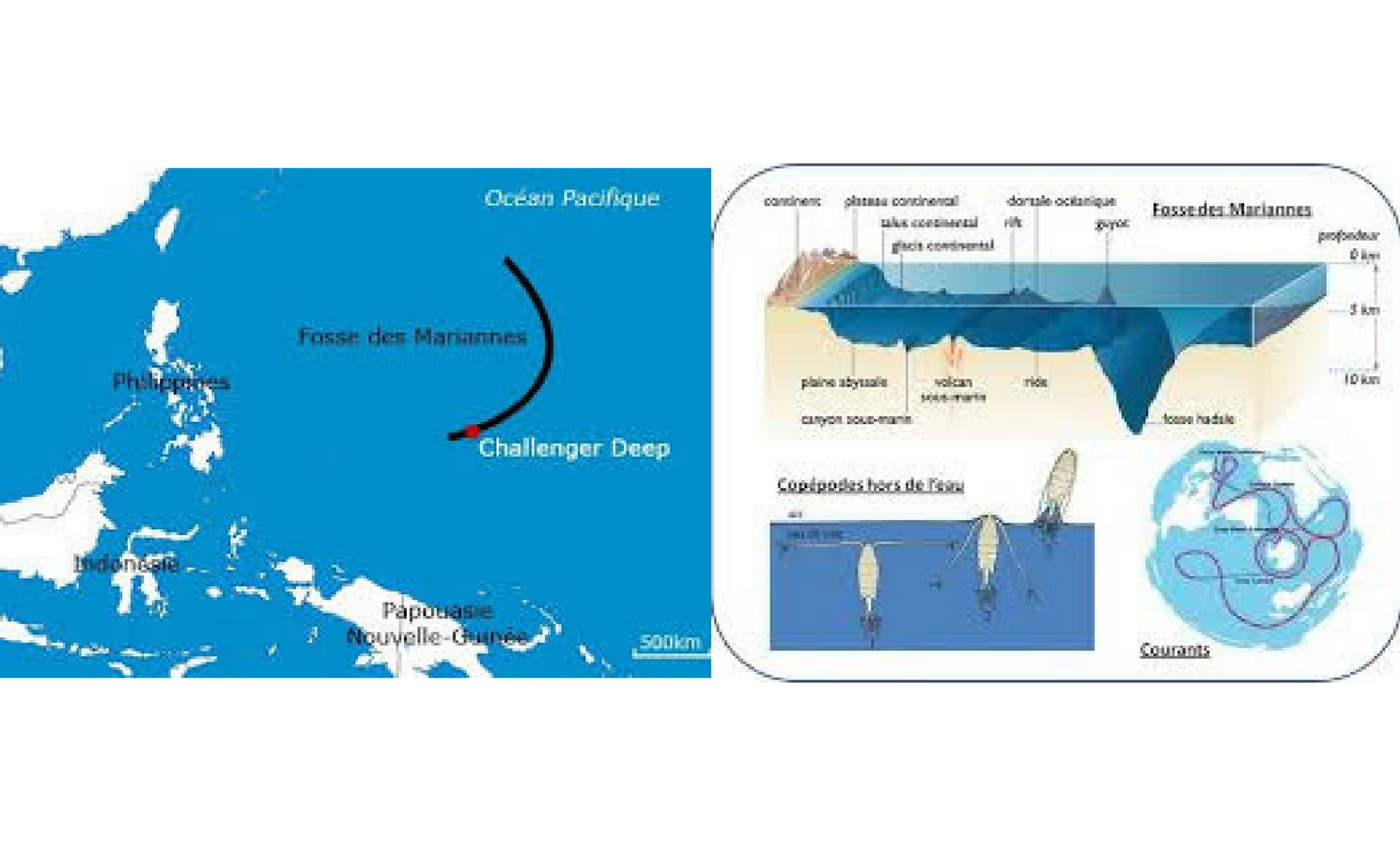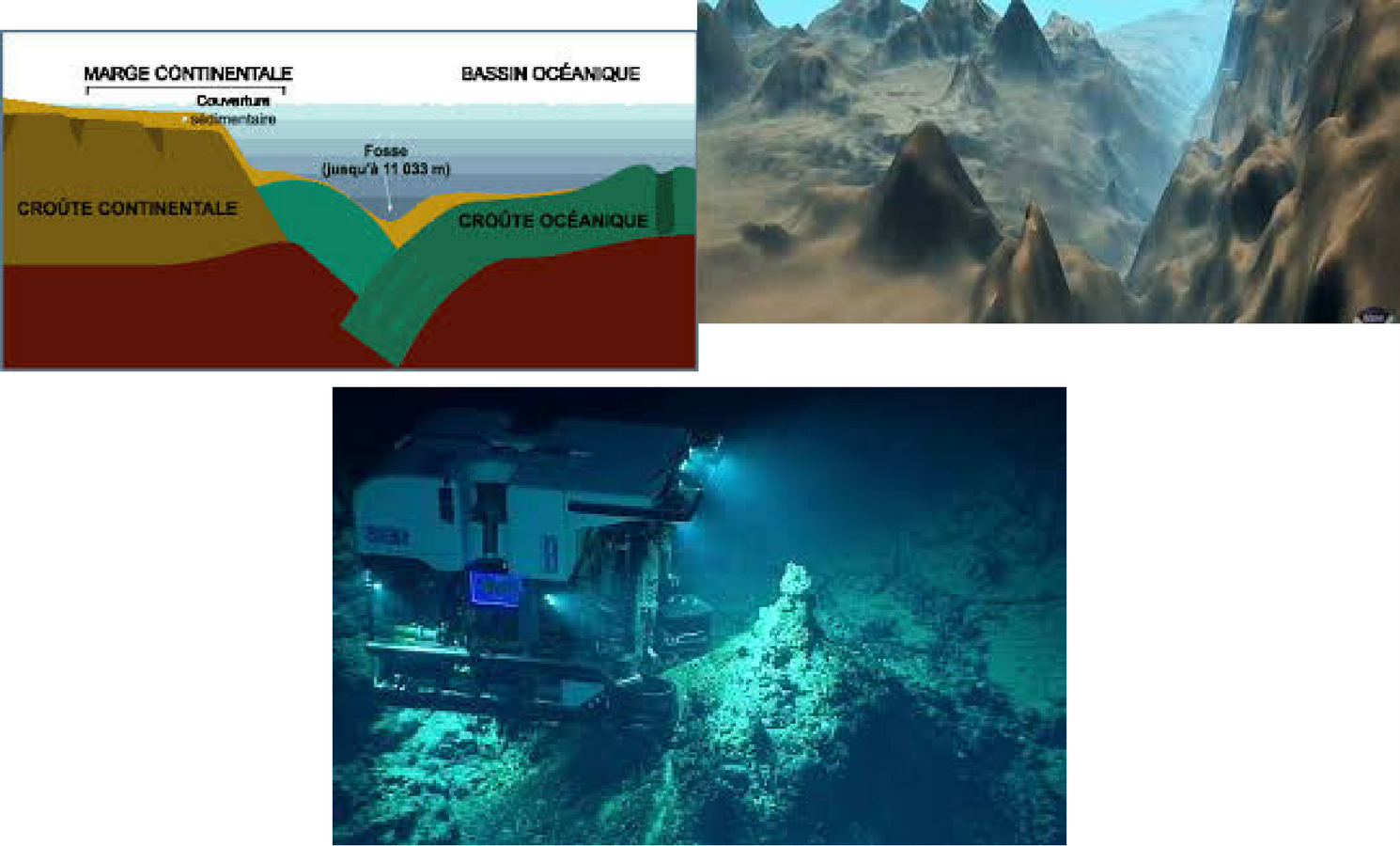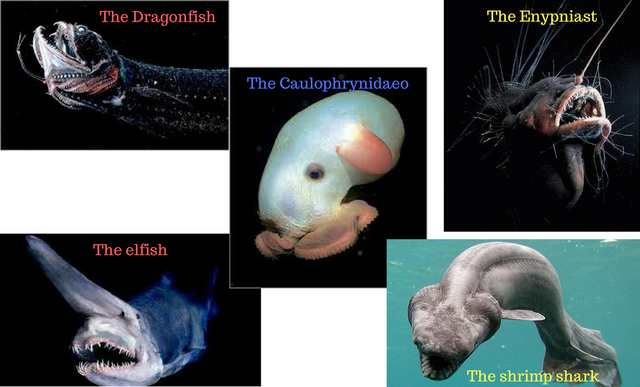The Mariana Trench "Immersion in the depths of the ocean."
This post is an adaptation in english of my post "Fosse des mariannes : immersion dans les abysses de l'océan". I would like to share this article with the English-speaking community.
Introduction
Does that mean anything to you? It's the deepest place on Earth at 11 000 meters below the Pacific Ocean !
It was watching a report on Ushuaia TV that fascinated me about this place.
In this underwater seabed of burning volcanic mountains, it is a strange world with the largest geological structure on earth. A strange marine fault intrigues scientists: the "Mariana Trench".
In 1872, the man sent a Royal Navy ship (the "Challenger") to carry out the world's first oceanographic campaign. They used 400 km of rope and hundreds of kg of ballast, travelled 120 000 km and probed the depths every 220 km. It was tedious and very tiring work but it was the only way to measure the seabed ! And it was off Guam Island in the western Pacific that the crew plunged the ballast to more than 8 000 metres. We discover that the ocean floor is not flat !
No one at the time understands how this flaw was formed. But sixty years later, sonar will revolutionize this study of the underwater seabed. This is the beginning of seafloor mapping.
The deepest point of the oceans
It is in 1951, that a ship of the Royal Navy returns to the top of the fault, and they discover that it is a huge pit which extends on 2400 km to the Marian islands. And at the southern end of the pit, the oceanographic floor sinks an additional 3000 meters to reach the deepest point of the oceans ("the Deep Challenger"), so 11 034 meters !
One question remains: why did this chasm sink so deep into the ground ?
Dr. Bob Stern of the University of Texas and earth scientist believes this phenomenon is due to the behaviour of the plate that sinks into the Earth's mantle. In fact, a narrow band of the crust has torn and is almost vertical as the mantle moves.
Monstrous creatures
These abyss are inhabited by unique and almost monstrous creatures. No light at this place, very little food and therefore a very difficult survival! The elfish shark has a huge upper jaw that can detach itself completely from the skull. The Caulophrynidaeo is one of the ugliest creatures : its name comes from the Greek "Trond Toad".
The Enypniast has a range of fused tubular feet that surround a large part of its anterior end and are used for movement.
The shrimp shark is a prehistoric beast with 300 trident teeth in 25 rows. It would have the longest known gestation time in vertebrates : 3.5 years.
Dragonfish produce their own light, thanks to their small blinking goatee under their small head, which allows them to attract prey.
Here are a few examples of incredible creatures, but there are still 95% of the abyss that are unexplored. So many surprises are still hidden in the depths. Many prehistoric creatures must hide there...
Let's also talk about the earth's crust...
Research in the "Mariana Trench" has really improved our understanding of plate tectonics. We now know that a planetary network of subduction zones draws tectonic plates around the globe by moving continents ! This has changed the face of the Earth for millions of years.
During the studies of the ocean ridges, geologists thought that at the same time as the magma was rising to the surface, the two plates of the west pacific receded. While it is quite the opposite, the exploration of the Trench proved the opposite !
Marcia Mcnutt of the Monterrey Bay Research Institute explains this : "when the fledgling tectonic plate moves away from the Pacific ridge it is made of high temperature floating magma, but when arriving in the pit it is a cold, heavy and dense crust and therefore the front plate which is heavier pulls the rest to sink into the mantle and pushes it forward.
The fastest moving plates are those that sink into pits. And among the nine plates it is the one of the Pacific that moves the fastest because it is surrounded by twelve pits! Pits swallow the oceanic crust faster than ridges produce. How voracious these pits !
In millions of years, the Pacific Ocean will disappear and Australia will be stuck in the USA ! Seattle will be next door to Sydney because of all these subduction zones... Earth and nature never stopped surprising us !
Let's keep exploring our oceans to ask ourselves the right questions and above all, let's respect our Planet while there is still time !!!!!!!!!
Pits swallow the oceanic crust faster than ridges produce. How voracious these pits !
In millions of years, the Pacific Ocean will disappear and Australia will be stuck in the United States! Seattle will be next door to Sydney because of all these subduction zones... Earth and nature never stopped surprising us !
Let's keep exploring our oceans to ask ourselves the right questions and above all, let's respect our Planet while there is still time !!!!!!!!!
I hope that this article will have aroused your curiosity and above all opened your eyes to the beauty of our oceans and the mysteries hidden in them... I will read your comments with great pleasure:)
#References/Sources :#
Reportage sur Ushuaia TV
Buzzly.fr
#Photo Credits - In order of appearance :#
Photo 1 - Bio 95 bis - Figaro
Photo 2 - Planète Gaïa bis- Académie Reims Bis° Le Matin
Photo 3 - Futura Science Bis - Jeunes Géographe Bis° - Slate
Photo 4 - Anecdote Bis - Buzzly Bis° - Les profondeurs des abysses
#For those who would like to know more, here are some links about the subject:#
https://en.wikipedia.org/wiki/Mariana_Trench
https://www.livescience.com/23387-mariana-trench.html
http://www.sciencemag.org/news/2017/01/expedition-probes-ocean-trench-s-deepest-secrets
I translate some words with a translator.
.png)
.png)
.png)

Well done! This post has received a 5.00 % upvote from @litasio thanks to: @steemstem-bot. Whoop!
If you would like to delegate to the @LitasIO you can do so by clicking on the following link: 10SP